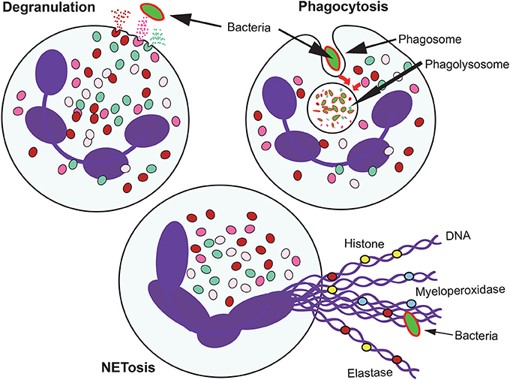Immunomics Services
Immunomics Services for Neutrophils
Neutrophils are the most abundant leukocytes in circulation and have great phenotypic heterogeneity and functional diversity, making them considered important regulators of inflammatory and immune responses. CD Genomics offers immunomics studies in multiple dimensions to help you understand the role played by neutrophils in homeostasis as well as in pathological inflammatory and immune processes.
Introduction to Neutrophil
Neutrophils are produced in large numbers in the bone marrow by hematopoietic stem cells. These cells are transformed into bone marrow cells under the control of granulocyte colony-stimulating factor (G-CSF) and thus committed to neutrophil production. During differentiation, developing neutrophils change their nuclei from round to ribbon-like and then to a lobulated morphology, while also expressing various receptors.
 Fig.1 The process of neutrophil production in the bone marrow. (Rosales, C., 2018)
Fig.1 The process of neutrophil production in the bone marrow. (Rosales, C., 2018)
Function of Neutrophils
Neutrophils are important effector cells in the innate immune system. Neutrophils have three main anti-microbial functions, namely phagocytosis, degranulation, and release of nuclear material in the form of neutrophil extracellular traps (NETs). In addition, neutrophils respond to various signals, influence the activity of regulatory neighboring cells, and regulate the long-term immune response of macrophages.
 Fig.2 The mechanism of phagocytosis, degranulation, and NETosis. (Rosales, C., 2018)
Fig.2 The mechanism of phagocytosis, degranulation, and NETosis. (Rosales, C., 2018)
Immunomics Studies for Neutrophils
Several immunomics studies based on transcriptomic, epigenomic, and proteomic analyses have now redefined many fundamental concepts of neutrophil development, plasticity, and functional heterogeneity.

Epigenomics
The recognition that neutrophils exist in transcriptionally distinct subpopulations and maturation states prompts researchers to investigate the role of chromatin accessibility and transcription factor regulation in neutrophil development, plasticity, and function. Epigenomic approaches, such as transposase-accessible chromatin sequencing (ATAC-seq) and chromatin immunoprecipitation and sequencing (CHIP-seq), have elucidated factors specific to neutrophil gene expression and regulation at the epigenetic level.

Proteomics
CyTOF uses heavy metal-conjugated antibodies to interrogate individual cells for surface and intracellular protein expression, which frees them from the limitations of fluorescence detection and greatly increases the number of markers that can be analyzed simultaneously in individual cells, while also allowing barcoding and multiplexing of samples. Recently, mass spectrometry has become a common tool for studying the phenotypic and functional heterogeneity of neutrophils in development and homeostasis, infection, inflammatory diseases, and cancer.
Our Services
As our understanding of the heterogeneity, plasticity, and environment-dependent function of neutrophils in vivo continues to grow, a range of high-dimensional multi-omics techniques is urgently needed. CD Genomics provide a wide range of immunomics services to help our clients to understand the function of neutrophils in the immune system.
Why Choose Us
Although neutrophils are the most abundant cells in human blood, their study can be challenging. Based on our extensive immunomics knowledge and experimental experience, we offer our clients professional and efficient immunomics analysis services for neutrophils to help them understand the important role of neutrophils in the immune process. Please contact us for more information.
Reference
- Rosales, C. (2018). Neutrophil: a cell with many roles in inflammation or several cell types?. Frontiers in physiology, 9, 113.
